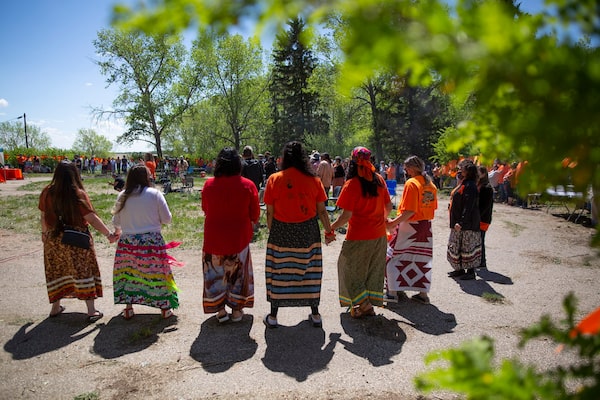
Attendees perform a round dance during a press conference and prayer vigil at the former Muscowequan Indian Residential School, one of the last residential schools to close its doors in Canada in 1997 and the last fully intact residential school still standing in Saskatchewan at Muskowekwan First Nation, Sask.Kayle Neis/The Canadian Press
A group representing 74 First Nations in Saskatchewan will receive almost $5-million for research related to finding the burial sites of children who never returned to their Indigenous communities from residential schools.
Federation of Sovereign Indigenous Nations Chief Bobby Cameron said the funding from Ottawa will help the communities to gather information and move ahead on ground-penetrating radar searches.
Hundreds of residential school survivors have shared that they had classmates who did not make it home, Mr. Cameron said, adding that teams will be sent to several sites across the province in “the hopes of locating these children to bring closure to the survivors, their descendants, and their communities.”
“It is a positive step towards healing and reconciliation for government to finally give these families and communities the closure they deserve and peace to the thousands of little souls in the unmarked graves surrounding these schools,” Mr. Cameron said.
The $4.88-million announced is from $27-million in funding that Ottawa has said will be available to Indigenous communities for further investigation of former residential schools sites. The funding was set aside in the 2019 federal budget for the creation of a register of student deaths at residential schools and to help Indigenous communities hire archeological search firms to locate unmarked burial sites and to help commemorate children who died.
At the end of May, Tk’emlúps te Secwépemc Kukpi7 (Chief) Rosanne Casimir said that a preliminary search using ground-penetrating radar had revealed the remains of 215 children on the grounds of the former Kamloops Indian Residential School in British Columbia. The announcement sparked commemorations across Canada and demands for provincial governments and Ottawa to aid in the process of investigating former residential schools.
Crown-Indigenous Relations Minister Carolyn Bennett said Tuesday that Saskatchewan First Nations “know best what they need” and that the federal government will support their work.
“We must never forget those innocent souls lost as a result of colonial policies,” she said. “This is our collective commitment toward reconciliation.”
On Monday, the House of Commons unanimously adopted a motion that included calls for a national residential school monument to be erected in Ottawa, and for financial resources to be deployed to Indigenous communities to ensure they can identify unmarked burial sites at former residential schools.
The motion, from Bloc Québécois Leader Yves-François Blanchet, was tabled on National Indigenous Peoples Day. It also included a call for the federal government to ensure religious entities that participated in the residential school system provide access to relevant archives, in order to assist with research into abuses at the schools.
Former Truth and Reconciliation Commission chairman Murray Sinclair told The Globe and Mail last week that the $27-million amount seems inadequate to him. He called for an independent investigation into deaths at residential schools. He also said that such a probe should not be left in the hands of governments, the police or church organizations. Indigenous leaders should be involved in deciding who will carry out the work, he said.
Ms. Bennett said Tuesday the government is beginning with community-based approaches.
Know what is happening in the halls of power with the day’s top political headlines and commentary as selected by Globe editors (subscribers only). Sign up today.